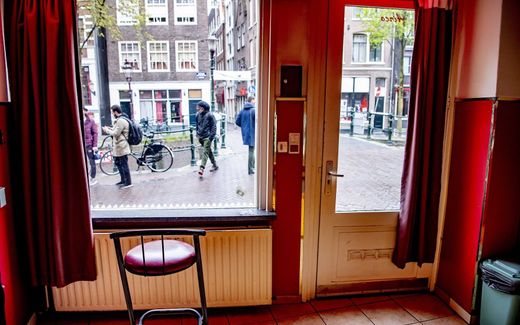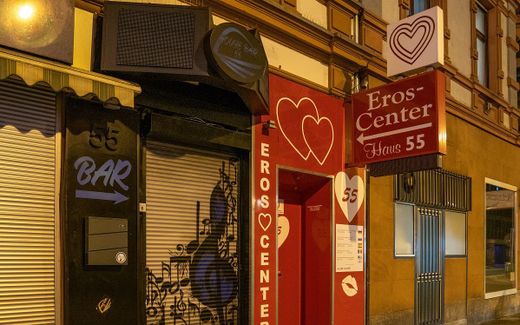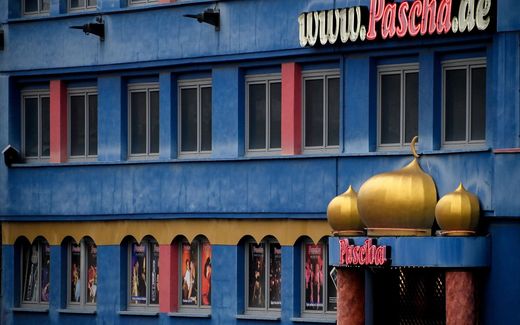The fighter against prostitution
10-09-2022
Central Europe
Anna Lutz, PRO Medienmagazine
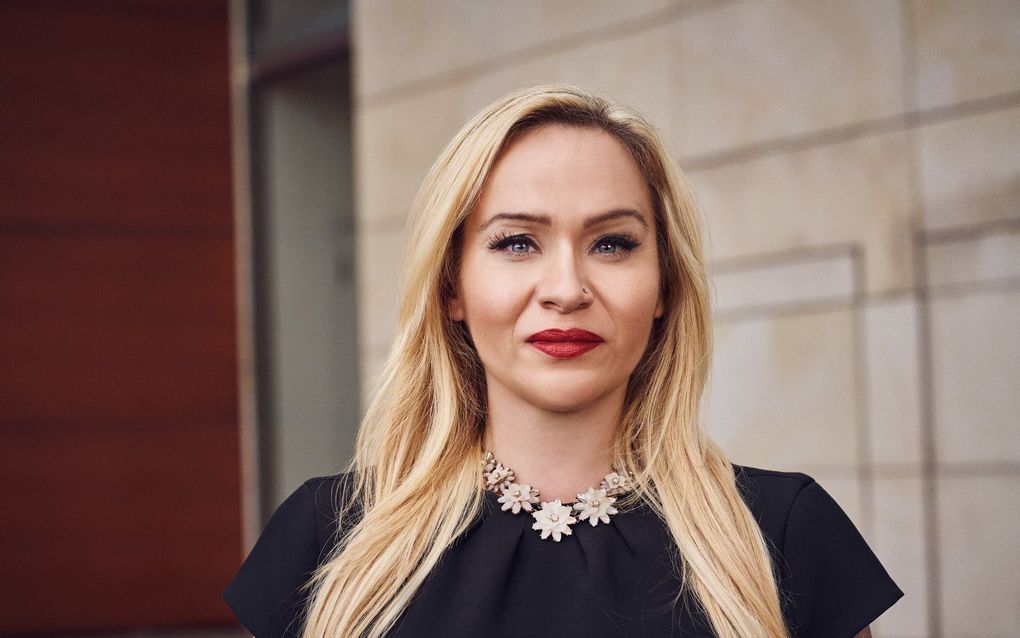
Huschke Mau. Photo Facebook
Central Europe
Huschke Mau was a prostitute. Today she fights for a ban on prostitution. After spending years in a brothel, she is certain: every brothel visitor is an offender. And prostitution without violence is impossible.
Every woman can end up in prostitution, Huschke Mau says. There are only four necessary ingredients: trauma, sexist experiences, poverty, and someone who helps you to get into the world of prostitution. In her book "Entmenschlicht" (Dehumanised), she tells her story –using a pseudonym.
"Please, please not, I can't." Huschke's mother begs, cries, whimpers. A beating follows—her stepfather screams. After a while, the beating lessens. Only some indefinable noises are heard through the wall. Huschke Mau was not even three years old when she first witnessed violence. She lies in her bed, frozen, does not dare to move, and does not understand anything from what she hears from the master bedroom below.
That changes as the years go by. The older Huschke becomes, the more she understands the danger threatening her at home. Her stepfather, a bricklayer and truck driver, hauls her out of bed when she is five. He then drags her by her hair over the floor, kicks her towards the living room, beats her up with his fists and screams: "Do you know what you did?" Huschke does not. The father then finds a catalogue and criticises the pages. "Don't ever do that again!"
The violence does not limit itself to fist beatings and kicking. In the bathroom, he pushes Huschkes face under water and counts the seconds until he lets go at the last moment. When Huschke is twelve years old, he enters her bedroom while naked. He then sits at her bedside and explains sexual practices to her. The child internalises: "Where I am is violence. Where I am, abuse takes place. And the other way around, violence belongs to me. Her only way out: making herself go away, as she calls it herself. Unconscious dissociation. Her mind flees into blackouts to not feel the pain.
There is no external help. Her grandparents and even Huschkes mother cover up the violence of her stepfather. The neighbours ignore it when the situation explodes again.
Sexism
At the age of 17, Huschke secretly packs her belongings. She flees to a help centre for young women. The workers there discourage her from filing a report against her father. Too often, perpetrators go free, and problems only worsen after that.
The local youth department invites Huschke to a conversation. Huschke and her parents meet under the supervision of a social worker. However, in the end, it is just one word against the other. Huschke feels like no one believes her. The girl is traumatised, harms herself by cutting herself in her arms, has more blackouts and roams the streets at night.
Time and time again, men approach her, call after her and often see her as a prostitute. Once, when she works in a youth club, her colleague tells her that he and his friend often go into the city to "watch prostitutes". Shamelessly he asks her: "Do you stand there too? For real, do you stand there too?" Huschke does not realise that hostility against women, inciting language, or assaults can be seen as violence or sexism. The years of living at her parents' house have normalised humiliations for her.
Poverty
Huschke barely passes her exams. She wants to study but does not have the money for it. Her parents do not give her money for her living, and the youth department no longer takes responsibility for her. Huschke moves to a different place and is of legal age.

She could start a procedure against all these injustices, but she does not have the energy to do so. Suddenly, she is confronted with a pile of paperwork and official forms that she has to deal with. Proof of income, insurance, work experience for a job, notices about surcharges – she cannot deal with all of this, let alone find her way through. "I have to get out, but I don't have money, no perspective, and no one helps me", she describes her feelings. The next time she is approached on the streets, she does not respond as she used to: pointing her middle finger. This time, she goes and says: "For 70 euros."
Entering prostitution
Two weeks after Huschke decided to prostitute herself, she receives her first customer. "I stood in front of his bed, undressed and felt nothing", Huschke remembers. After everything is over, her client looks at her damaged arms and says: "What is wrong with you? Where are your parents?" Huschke leaves the house and feels empty.
Sometime after that, she sees an advertisement in the newspaper: "Looking for a partner for a serious escort service and erotic shoots." That is how Huschke gets to know police officer Mike, her first pimp.
Mike tells Huschke everything she needs to know about prostitution. She receives a business phone to arrange meetings. She finds her clients via advertisements. Mike buys lingerie for her and stockings. And arm sleeves to cover the cuts on her arms. At first, Huschke meets the men in hotel rooms or their houses. She calls herself Svenja: "Svenja is everything a client desires, a projection screen for his wishes."
Because Huschke is homeless, she moves in with Mike. She sleeps with him while he explains how to behave towards clients. And he isolates her from her former life. After a while, Huschke's days are only about making money. "When was the last time I spent time with a human who did not want me to satisfy him? When was the last time I was able to lay in the sun? I don't remember", she recalls.
Another advertisement pulls Huschke even deeper into the world of prostitution. She introduces herself in a brothel where the owner is looking for a colleague. The most important thing is to get away from Mike.
Brothel life
Huschke's new employer calls herself Stella. Her brothel is located in an ordinary house, without any advertising on the outside. The curtains are permanently closed. The living room is the lounge; two other rooms serve as so-called work rooms. In the workrooms, there are large beds with side tables on which are condoms, lube and tissues.
Of the money she earns, Huschke is allowed to keep 50 per cent. However, she also has to pay part of the expenses for the advertisements. In addition, she is charged for all the rides she has to make to get to different locations.
Drugs are ubiquitous in the brothel. At the start of the day, the women use speed. Without amphetamine, hardly anyone lasts through the shifts.
The job is one transgression. The clients choose the prostitutes based on height, weight, hair colour or the form of her intimate shave. They desire intercourse without a condom, anal sex or other humiliating practices. They also verbally assault the women during intercourse or request acts that are not compatible.
If a prostitute rejects the request, she does not earn any money. If she sends a client away, she can count on a penalty. So-called penalty measures also apply when one arrives late. "Within a short time, you feel like you are buying it all the time and yet you feel burnt out constantly.", Huschke describes the hamster wheel in which all the working women have to run.
Huschke spends several years in different brothels before she can leave the sector more and more. She learns: "Prostitution is sex which is completely focused on the needs of men." for her, this form of sex is not consensual, even when the prostitute says yes. When dire need plays a role, sex is not voluntary. In her book, Huschke Mau cites a so-called prostitute client forum on the internet. On it, men exchange thoughts about women. Furthermore, she quotes from her memory of how customers would talk to her. The words are too brutal and humiliating to write down in this article.
Whoever reads the book "Entmenschlicht" (Dehumanised), will get the feeling of it: Racism, sexism and sexual violence belong to the daily life of most prostitutes. Therefore, years after she got out, Huschke Mau fights for a ban on sex for sale. Often, she is verbally attacked for her action by public figures, both online and in public.
Last April, Huschke Mau visited the NDR-Talk Deep and Deutlich. There, she talks about her life and the German Red-Light District. However, she is barely able to. Especially the blogger and Spiegel author Sascha Lobo attacks Mau for her critique of prostitute clients in general. He accuses her of downplaying sexual violence by saying that all sex bought is a form of rape. Mau then leaves the studio. The woman, who has been through so much, does not want to be accused of sexism by a middle-aged, well-off man. Thus, she cancels all her interviews in the following weeks, also the one with PRO. She needs a break.
More than a million men visit prostitutes daily
According to estimates, more than a million men in Germany pay a daily visit to prostitutes. Every third German male has done so at least once in his life.
Although forced prostitution is illegal, most sexual services are under economic or physical pressure. Huschke is not an exception. Her story is similar to that of hundreds of women in Germany. And yet, prostitution is tolerated by the police, state and society.
"We should ask ourselves what kind of world we want to live in, " Huschke Mau says. After years in prostitution, she has fought for and achieved her freedom. She returned to university and earned her PhD. She founded a network for prostitutes who want to step out and presents herself as an activist that stands up for their interests. "We have to fight every day", she writes in her book. A fight to resist the urge to take drugs and not let old wounds take over her life. And a battle to not believe the voices in her head that tell her: "You are worth nothing; go sell yourself again in the shit where you belong."
"Every suitor is guilty"
Ever since the ex-prostitute Huschke Mau published her biography "Entmenschlicht" (Dehumanised), Germany has been discussing a ban on buying sex. PRO asked street worker Gerhard Schönborn: Does good prostitution exist?
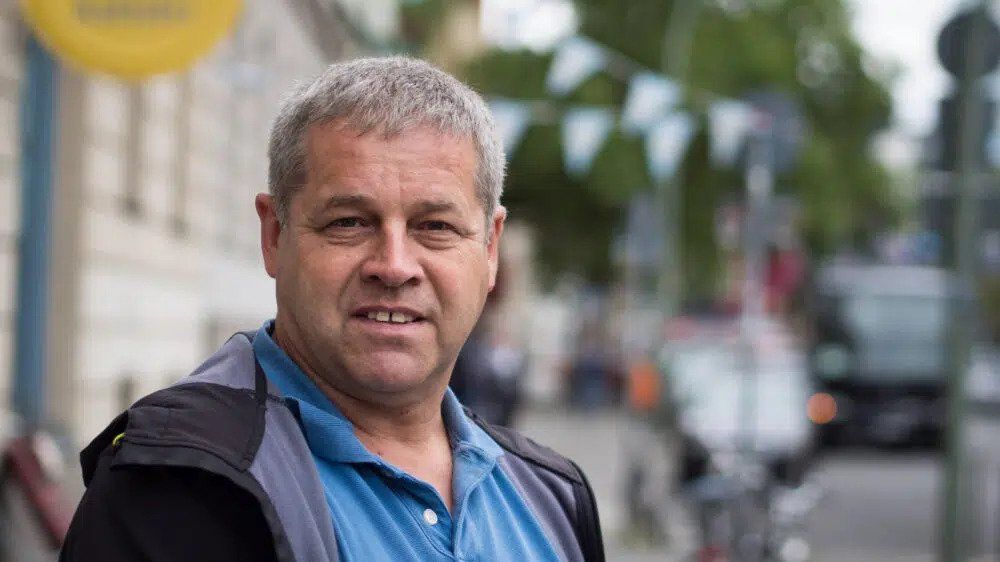
An ordinary Monday evening on Berlin's Kurfürstenstrasse: a group of school children walk along the sidewalk, laughing, enjoying the class trip to Berlin. They barely pay attention to the woman who stumbles around in circles, whispers to herself, and keeps smiling confusedly at the passing cars. One of her eyes is bloodshot. Like the Bulgarian girls across the street, she is waiting for clients. To make money for drugs. Or just for a place to sleep.
A few metres away is a so-called performance box, a wooden house rented by the Belin Senate. It includes a toilet and is also where sex shops are supposed to disappear from the public eye. You do not have to open the door of the tiny house to get an idea of what it looks like inside. Dirty paper towels lie in front of it, and a yellow puddle has collected on the sidewalk.
At the Kurfürstenstraße tram exit, Café Neustart (restart) opens its doors several times a week to welcome women who need a break from their work on the street. The aid organisation run by Christians offers a drink, food, clothing and an open ear for the needs of the prostitutes. And if you want to, you can also get help to get out here. PRO meets street worker Gerhard Schönborn there.
Mr Schönborn, can every woman end up in prostitution?
Gerhard Schönborn: "All sorts of women come to our café, even some from a Christian family. Many come from desolate family backgrounds, but some also have decent backgrounds. One thing the women have in common is that something went wrong in their lives. Be it at some point they wanted to break out of the strictures of home or that they came in contact with drugs; or with a so-called lover boy, I.e. a man who pretended to be in love with them but actually wanted to get them into prostitution.
The main reasons women end up here on Kurfürstenstraße are poverty, drugs and past abuse – and low self-esteem.
The author Huschke Mau, a former prostitute herself, thinks that good prostitution does not exist
"Many people, including women, say that they are in prostitution voluntarily. I cannot look into their heads or their hearts. But I have found out in longer conversations, even with these women, that abuse experiences play a role. Then, of course, you can ask yourself: How voluntary is prostitution if there is trauma in the background? Either way, prostitution is always sexual exploitation. It does not just pass by any woman standing here on the street. The work destroys a lot in them. However, often women do not realise that until they have gotten out.
Where then does the power and presence of the sex worker lobby come from?
"The voices are few but loud. My answer is: There is a lot of money in the sex business. In my opinion, the fact that the few women who state that they like working as prostitutes are so visible in our society has something to do with the fact that many of them earn money from the business or benefit directly: the state through taxes as well as the sex industry.
And don't forget one thing: where men are in charge, there are always women who are pimps themselves. On the other hand, how does telling her painful story benefit a woman who has everything behind years ago? She is a victim and, above all, wants to start a new life. Women like Huschke, who commit themselves to helping others, are the big exception. That takes a lot of courage."
Is every suitor a perpetrator?
"Definitely! No suitor knows what kind of woman he has in front of him. Whether she has a pimp or what other compulsions led her to prostitute herself. Every woman here on the street is forced to act. It is easy to see because some of them collapse when no car drives by, and the next time they stop, they smile and start flirting again. Every suitor takes advantage of the women's plight. Even if he does not know it but accepts it with approval."
If a woman wants to get out of prostitution on Kurfürstenstraße, how can she do so?
"Most women here are homeless and have no health insurance. Prostitutes – even the few who are tax registered – are essentially self-employed and cannot afford insurance. That means that you can neither go to the doctor nor into drug withdrawal centres."
We have had an exit apartment for some time where women could find accommodation. Then, they have a registered address and can gradually start their way back to a normal life. But we need many more institutions that accept women without preconditions – not only in Berlin but everywhere in Germany."
What does society need to know about prostitution that it does not already know?
"Women are exploited by men. There is hardly any self-determined sex work. Every suitor is guilty."
This article was translated by CNE.news and published in PRO on June 23, 2022
Related Articles


